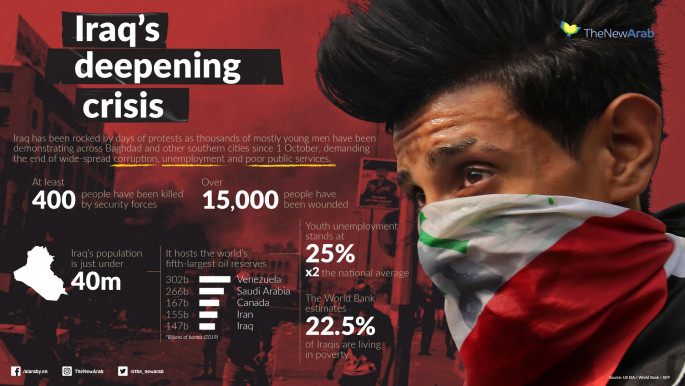Iraq's Sistani condemns killings and kidnappings of protesters
Iraq's Sistani condemns killings and kidnappings of protesters
In his Friday sermon, Ayatollah Ali al-Sistani spoke out against the recent wave of bloody violence, including the lynching of a 16-year old boy, thought to be a gunman.
2 min read
Demonstators in the city of Basra carry an image of the influential Shia cleric [Getty]
Iraq's Grand Ayatollah Ali al-Sistani on Friday condemned a recent wave of killings and kidnappings of anti-government protesters during his weekly sermon in the holy city of Karbala.
In a statement read out by the Shia cleric's representative, he urged full state control over the widespread use of weapons.
The comments follow an attack by heavily armed, masked gunmen, which resulted in the death of more that 20 people in Baghdad's Tahrir Square last week.
Sistani also condemned the gruesome execution of a 16 year-old boy, for the alleged killing of four anti-government protesters and two shopkeepers.
It has since emerged that he fired a pistol into the air, to clear protesters away from his home, according to media reports.
Read more: Iraq protestors hang body of alleged executed sniper in Baghdad square
In his weekly message, Sistani also adressed Iraq's armed forces, who he called on to be "loyal to the nation, and free from foreign influence".
Twitter Post
|
Iran-backed paramilitary groups constitute a formal branch of Iraq's domestic security forces.
Yet some operate independently. The militia groups have close ties to major figures in Iraq's ruling political class.
Sistani has long been opposed to foreign influence, as well as the Iranian model, whereby senior clerics play a central role in running state institutions.
While rarely weighing in on politics other than in times of crisis, the Grand Ayatollah nonetheless commands a massive sway over public opinion.
Read more: Top Iraq cleric Sistani urges cabinet change after 'protestor massacre'
Hours after he declared that he no longer supported the government, Prime Minister Adel Abdul Mahdi pledged to resign.
Sistani has addressed the protests and unrest which has rocked Iraq in every weekly sermon, since demonstations began on 1 October.
At least 400 people have died since then, with thousands of Iraqis taking to the streets in Baghdad and the country's predominantly Shia south, decrying endemic corruption, poor services, rampant unemployment levels and an end to the political system imposed after the 2003 invasion.
Iraq's Tahrir square has now been transformed into a heart of the protest movement, even as the crowds have been dispersed with live fire, tear gas and sonic bombs.
Read more: Iraqi protestors have created a 'mini-state' in Baghdad's Tahrir Square

Follow us on Twitter and Instagram to stay connected
![Sistani ]Getty] Sistani ]Getty]](/sites/default/files/styles/large_16_9/public/media/images/4CE32618-655F-442B-A8BA-F7FA7D208ADF.jpg?h=d1cb525d&itok=NkVyomMx)


